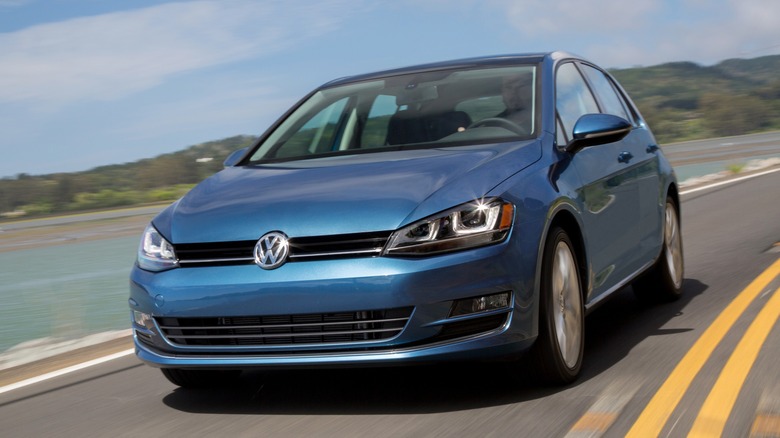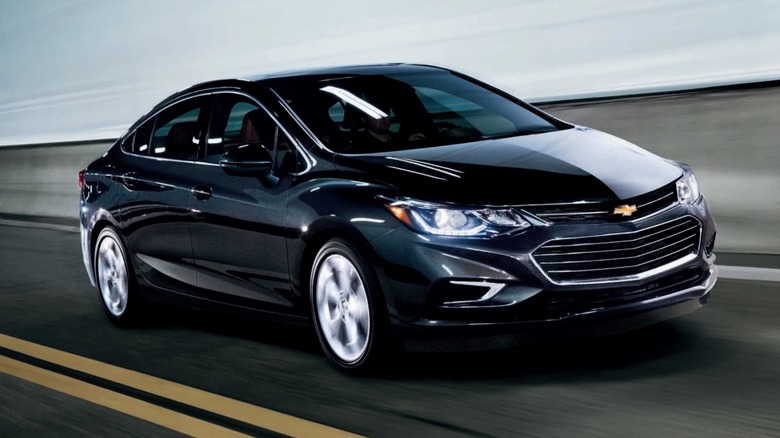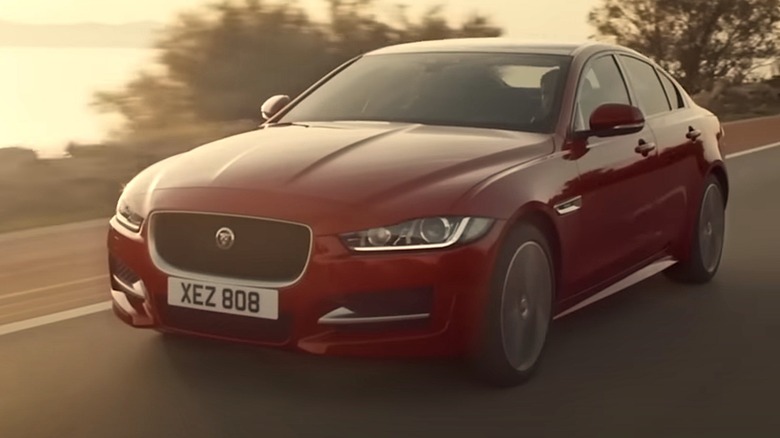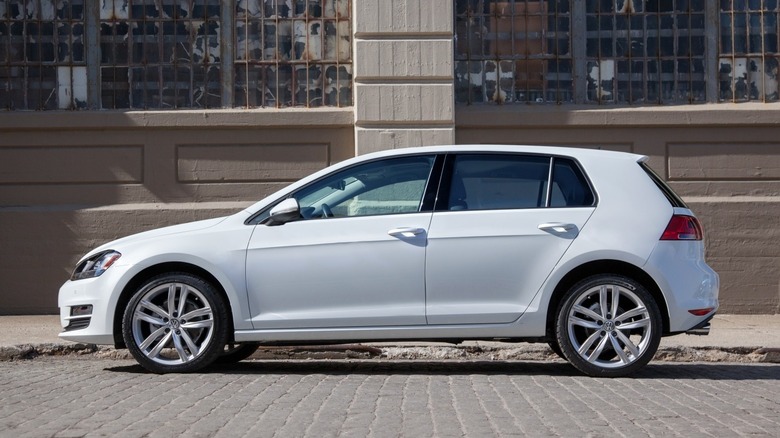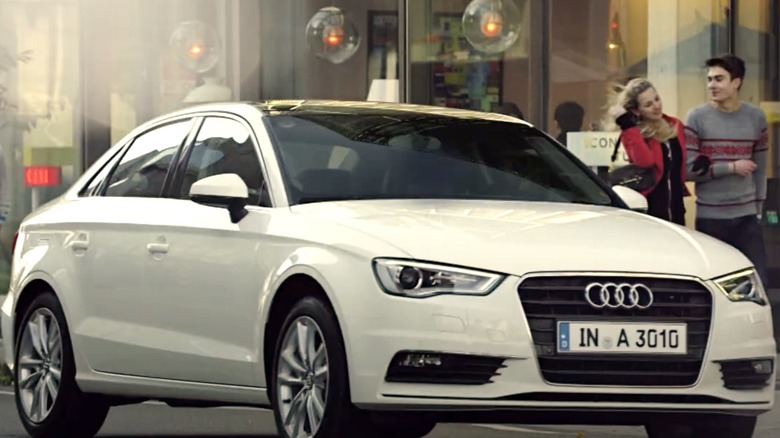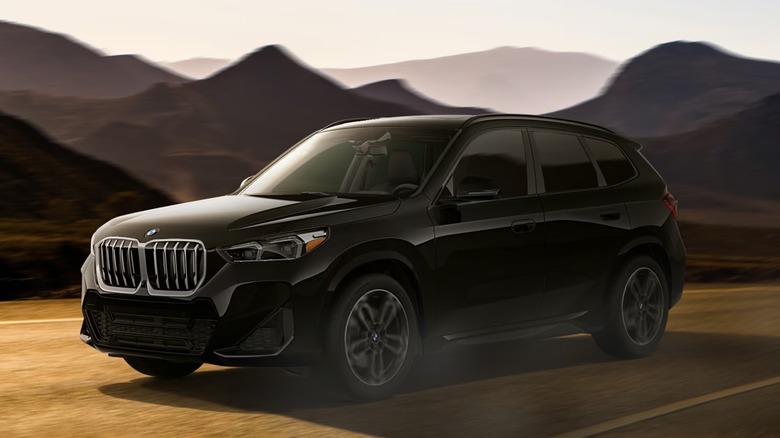5 Compact Cars You May Not Realize Have Diesel Engines Under The Hood
Virtually every automaker on the planet is now using or actively developing technologies designed to sway automobiles from their reliance on fossil fuel burning internal combustion engines. While progress is being made, fossil fuels remain the primary source of power for most engines, and in the fossil fuel game, a decades-long debate continues to rage regarding whether diesel or gasoline engines are the better option for most cars.
Gas-powered cars are, of course, far more prominent in the North American markets, where diesel has become a bit of a dirty word among consumers. Meanwhile, diesel builds make up a major segment of the European automotive arena, as they are traditionally more fuel efficient and can offer just as much power as traditional gas engines. Despite Volkswagen's 2015 "Dieselgate" scandal damaging the diesel name, European automakers continue to use it to power many of their vehicles, and even a few American automakers have dabbled in diesel over the years.
As it stands, both Euro and certain U.S. manufacturers have specifically found diesel to be a good fit to power some of the more compact vehicles in their respective fleets, as the powerful and efficient engines can provide some serious umph to the smaller builds. There are more compact and compact-adjacent cars out there with diesel engines than you might think. Here are 5 popular small builds you may not realize are packing diesel heat under the hood.
2018 Chevy Cruze
While Chevrolet has delivered a celebrated diesel truck engine or two over the years, like many U.S. manufacturers, the company has largely avoided the use of diesel for its sedans and compact cars over the past several decades. Such as it is, you may be surprised to learn that Chevy indeed indulged in diesel power for one of its more popular compact builds of the 2010s, the Cruze. The vehicle made its diesel debut in North America in the 2014 and 2015 model years. However, some might argue the 2018 Cruze was the pinnacle of the compact vehicle's diesel dalliance.
As for the deference given the 2018 Cruze, power is a big part of the equation, with the vehicle's potent Ecotec engine providing a bit more muscle than its predecessors, with the 1.6 liter, 4-cylinder turbo diesel pumping a respectable 137 horsepower and delivering 247 lb-ft of torque. That's some pretty decent get-up-and-go for a vehicle boasting a compact frame in both its sedan and hatchback models, with each reportedly capable of hitting 60 miles per hour in roughly 8-seconds.
Perhaps more importantly, Car and Driver praised the '18 Cruze diesel as a legit fuel-saver from Chevy, noting an overall fuel economy of 38 miles per gallon, with the vehicle delivering an impressive 48 mpg on the highway. Sadly, the 2018 Cruze was one of the last compact diesel options offered by Chevy. In fact, the manufacturer discontinued the model just a year later as consumers skewed more and more toward gas guzzling SUVs.
2018 Jaguar XE
Luxury automotive brands like Jaguar are perhaps better known for making race cars and indulgent, performance-first passenger cars than compact vehicles. But the United Kingdom-based manufacturer has delivered a few smaller builds of note in its almost 100-years of existence. Among the luxury automaker's more celebrated compact sport sedans is the XE, which Jaguar put into production in 2015 and continues to manufacture today.
Yes, you could get an XE powered by a diesel engine if you wanted. The fact that the XE was available with a diesel engine at all was actually nothing to scoff, as Jaguar bosses had largely refused to use them to power their vehicles until 2003. By the time the XEs began rolling off the production line, diesels had become a notable addition to the modern Jaguar fleet. As for 2018's diesel-fueled XEs, some reviewers noted the 2.0-liter turbocharged four-cylinder engines never delivered quite the visceral punch Jaguar drivers had come to expect from the brand, cranking out a mere 180 horsepower and clipping a top speed of just 120-mph.
Those numbers were even more unimpressive as the supercharged gas-powered V6 versions cranked the hp up to 360. Nonetheless, the diesel equipped XEs boasted better-than-average fuel economy, with the rear-wheel build boasting 36 mpg and the all-wheel-drive getting 34 mpg. It's easy enough to imagine those numbers being a big selling point to cost-conscious drivers who wanted that Jaguar prestige, but also wanted to save a few pounds at the pump.
2015 VW Golf TDI
Yeah, it's gotten a little tricky to talk about Volkswagen and diesel engines since news broke that the company had been gaming the system with its "clean diesel" cars made between 2009 and 2016, some of which were emitting up to 40 times more nitrous oxide into the environment than allowed by U.S. emissions restrictions. While the "Dieselgate" scandal cost VW billions, it also did considerable damage to the global reputation of diesel fuel, even as it simultaneously brought to light just how many VW builds in North America offered a diesel engine option.
That list included one of Volkswagen's best-selling models, the powerful but compact Golf. Indeed, some VW lovers may have been surprised to learn that the vehicles have offered a diesel version since the 1976 model year, with VW likely hoping to tempt North American drivers with its diesel power with every ensuing build. Had it not been part of the "Dieselgate" brouhaha, the 2015 VW Golf TDI may have convinced U.S. drivers to board the diesel train.
Golfs have been revered over the years as particularly fun to drive, and the 2015 build did nothing to damage that legacy. It was also a sharp-looking Golf that could be equipped with a 2.0-liter TDI four-cylinder diesel engine that touched 150 horsepower, produced 236 lb-ft of torque, and gifted drivers 34 miles per gallon on the freeway. Unfortunately, "Dieselgate" forever tarnished the rep of the '15 VW Golf TDI, and ultimately led the company to re-think its entire North American diesel engine strategy.
2015 Audi A3 TDI
On the subject of vehicles that got wrapped up in Volkswagen's "Dieselgate" scandal, the 2015 Audi A3 TDI was one of the better-reviewed of the pack. That may have come as a surprise to some, as a lot of folks likely didn't know the A3 was actually manufactured by VW, nor did they realize it was powered by a diesel engine.
Yes, both of those facts are true, making the compact A3 sedan one of the higher-profile offerings listed among those equipped with VW's infamous emissions-dodging "Defeat Device." Like the Golf, the A3 TDI was a sight to see on the road, and per some reviewers, more than held its own when you opened it up on the freeway. Like the Golf, the A3 TDI came equipped with a 2.0-liter four-cylinder diesel engine that produced the same levels of horsepower (150) and torque (236 lb-ft) and went 0 to 60 in a little under 8 seconds.
The similarities between the Golf and A3 were hard to ignore, and even helped the latter vehicle earn the nickname "Golf in fancy clothes." Still, the fancy clothes made a big difference, as Audi engineering and the inclusion of the manufacturer's Quattro all-wheel drive helped the A3 earn a big-time upgrade in fuel economy, netting a whopping 43 miles per gallon on the freeway compared to the Golf TDI's 34. Unfortunately, the '15 A3 was a legit problem child for Audi even outside of its emissions issues, making it a divisive offering at best.
BMW X1
In the performance vehicle arena, few names are quite as revered as BMW. Though the company has been making celebrated automobiles for the better part of the past century, it is still relatively new to the diesel game, having only begun producing diesel powered cars in the 1980s. The company has continued to develop its diesel technology over the ensuing decades, with the sDrive18d and sDrive23d offered with the BMW X1 serving among the German automaker's strongest diesel engines yet.
The BMW X1 is technically an SUV. But it's a "compact" SUV, and a case could be made that compact SUVs are basically just slightly taller versions of compact sedans these days. In any case, it'll still likely surprise some that the X1 can be outfitted with a sDrive18d (front-wheel drive) or sDrive23d (four-wheel drive) diesel engine because many premium brands aren't offering diesel in the SUV arena these days.
BMW is hardly wasting the potential of the engines on the X1 either, with the 2.0-litre turbo diesel builds producing 148 bhp and 194 bhp respectively and delivering eye-popping fuel economy at 56.5 mpg (18d) and 58.9 mpg (23d). While you're sacrificing some of that vintage BMW gusto with either of those diesel options, getting that level of fuel economy in a typically sexy BMW package makes the Top Gear approved X1 diesel an intriguing option in a shrinking diesel game.
